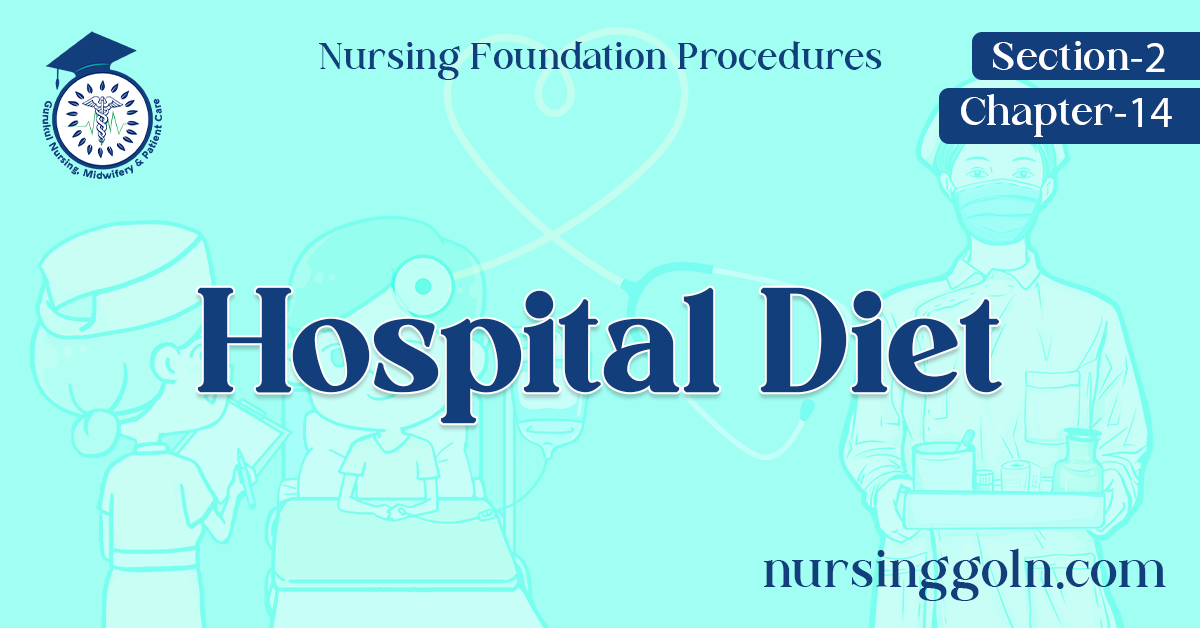Today is our topic of discussion Hospital Diet.
Hospital Diet

Regular Diet
- Full diet: It is a regular well-balanced diet. It is vegetarian or non-vegetarian this is for patients who do not need any special modification
- Soft light diet: It is given to provide light and easily digestible food with minimum residue. It contains food which requires little chewing and contains no fiber or no seasoning
- Bland diet: The foods are easily digestible, free form. substances which might cause irritation of the gastro- intestinal tract and generally or low roughage content, used mainly for patients with gastrointestinal conditions.
Liquid Diets
- Liquid diets: Must be used for patients who are unable to take or tolerate solid food. This diet is given usually to patient having hyperpyrexia, postoperative patients and patients having gastrointestinal disturbances
- Clean fluids: Used when there is a marked intolerance to food and roughage these include clear tea, weak black coffee, clear soups, whey water, strained fruit juices, clear fluid diet should be used only for a short time
- Full liquid diet: It is given the total nutrition of the patient has to be maintained by fluids for considerable time. This is necessary when the patient is unable to swallow solid food or if the patient is fed by intragastric or gastrostomy tubes.
Low Calorie Diet
- The total calorie intake is reduced to less than the body’s requirements so that the remainder of the calories required can be derived from the stored fat
- The aim of this diet is to slow steady loss of weight over a period of several weeks or even months. This diet is advised to obese patients
- The food stuffs are-ghee, butter, sugar, sweets bread, rice, and potatoes are omitted from the diet. Use salads fruits and boiled vegetables. The patient must have plenty of bulk in the diet by using high fiber foods and low calorie beverages.
Low Protein Diet
- Low protein diet is advised in kidney diseases such as nephritis, uremia. In these disease, the protein is avoided or given in low moderate type
- This type of diet is given to give the rest to kidneys because excessive protein intake acts as an additional load to the kidneys
- The food stuffs are-milk, eggs and meat, etc. are omitted or restricted according to the prescribed protein intake.
Low Fat Diet
- Low fat diet is restricted from the diet patients with liver diseases and gallbladder diseases. Carbohydrates in the diet should be increased to supply the liver with glycogen to prevent the ketosis
- No fried food-ghee or butter or other fat is allowed in the diet, only rice chapattis bread, fruits, dahi, and vegetables.
Salt Free Diet
- Sodium is totally or partially restricted the restriction of sodium depends on the severity of the condition of the patient
- The patients with heart diseases hypertension, kidney diseases, etc. are given salt restricted diet or low salt diet. The necessity of the restriction should be carefully explained to the patient and relatives
- The following foods are totally avoided-salt, baking powder pappads, canned foods, cheese, pickles, salted chips and biscuits, etc.
High Protein Diet
- High protein diet-the protein intake should be average from 75 to 100 g per day for adult. In protein energy malnutrition cases easily digestible and high nutritive value protein, e.g. milk protein should be given
- High protein diet is given to the patients such operated cases, tuberculosis accident, burns, nephritic syndrome and emacided cases as
- The food stuffs contains rich protein are milk and milk proteins, eggs, fish, meat, broth, dhals, dahi, beans, soyabean and groundnuts.
Diabetic Diet
- Diabetes mellitus-the metabolism carbohydrate, far and protein are affected. Diabetes is a lifelong disease which can be treated but not cured. The dietary treatment depends upon the severity of the condition .
- The purpose of diabetic diet is to keep the patient in good health to keep the blood sugar level within normal level and to keep urine free from sugar.
- The diet should be balanced but there should be restriction of carbohydrates, e.g. rice, biscuits, sugar, jams, sweets, honey, carrots, and sweet potatoes. The patient should have egg, milk, raw salads and all types of green leafy vegetables.
- The total calories required 20-25% should be from protein 40% from carbohydrates and 40% from fat.

Diet in Anemia
- This type of patient requires the diet which is high, in protein, high in iron and high in vitamins. The diet should provide necessary nutrients for the formation of new red blood cells or hemoglobin
- The main purposes are to provide necessary nutrients for blood cell formation and to remove the cause of anemia .
- The food stuffs recommended are liver, meat, eggs spinach, drumstick leaves, ragi, jaggery, etc.
